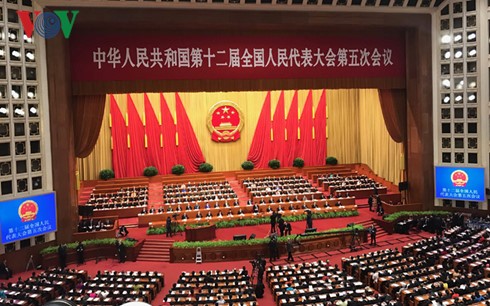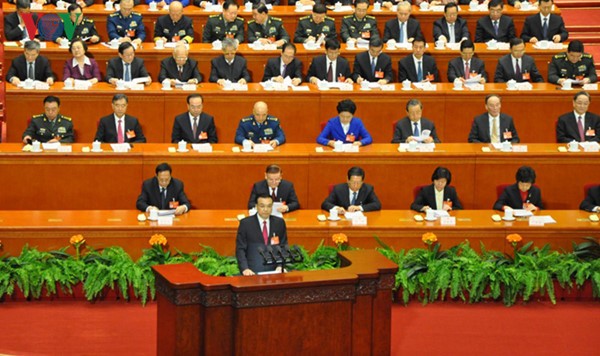(VOVworld) – The Chinese government has proposed a lower economic growth target for this year as part of its reform efforts. The Chinese leaders say the target is realistic about what is achievable.
 |
| The fifth session of the 12th Chinese National People’s Congress |
Opening the annual session of the Chinese National People’s Congress on Sunday, Premier Li Keqiang said China targets a GDP growth of 6.5% for this year, the lowest rate in 25 years. But it is enough to achieve the goal set by the Communist Party of China to double the size of the national economy by 2020. Last year, China’s growth rate fell to 6.7%, a 6-year low.
Realistic targets
China is shifting from rapid growth based on exports and investment to sustainable growth fueled by consumption. But the process has slowed down growth, devaluated the Yuan, and triggered concerns of a real estate “bubble” and a bad debt crisis. The Chinese Premier has warned against faltering global growth and rising protectionism. Beijing has worked to cool down housing prices, control credit growth, and cut public investment, leaving the economy dependant on domestic consumption and private investment. Last year China did not set any export targets for this year because of global growth uncertainty.
Economists are calling a 6.5% growth target reasonable. The Chinese Premier says the projected target is in line with both economic principles and realities, adding that it will help stabilize market expectations and facilitate China’s structural adjustments. It will also contribute to achieving the goal of building of a prosperous society.
 |
| Chinese Premier Li Keqiang addressed the session |
Key solutions
The Chinese government pledged to implement a flexible fiscal policy and reduce taxes on businesses by 51 billion USD. China is set to pursue a prudent and neutral monetary policy. Li Keqiang said China’s financial risk is under control, but vigilance is needed and a “fire wall” should be built to prevent risks. The government will apply a full range of monetary policy instruments, maintain basic stability in liquidity, hold market interest rates at an appropriate level, and improve the transmission mechanism of monetary policy.
Restructuring state-owned enterprises is one the government’s priorities. The Chinese Premier said the continued overhaul of ownership in more than 100 centrally-administered state-owned enterprises will be completed by the end of this year. Beijing will be more assertive in closing inefficient state-owned enterprises. Li Keqiang vowed to root out the heavy industry redundancy by reducing 50 million tons of steel and 150 million tons of coal. China seeks to close some thermal power plants or cancel new projects.
Although the set target for this year marks a 25-year-low, it enables the government to take flexible measures to improve both the quality and efficiency of economic performance.